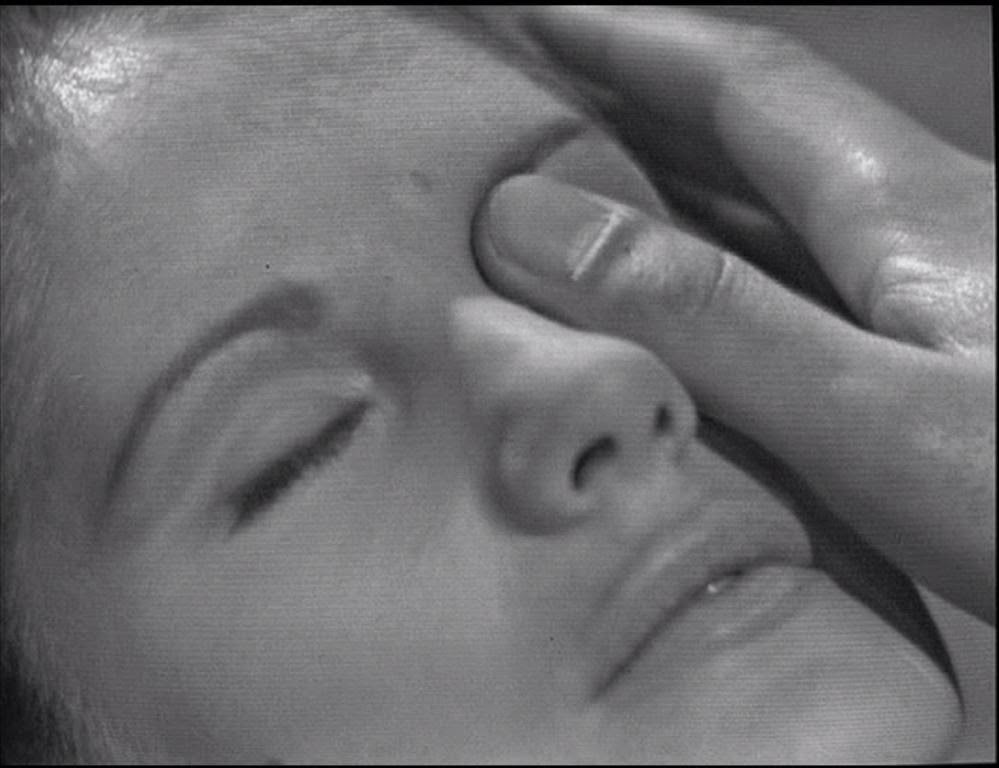Madame Danglars' out-of-control carriage is brought to a halt by the lasso skills of the Count of Monte Cristo's slave, Ali (the Count claiming that Ali regularly pops outside to practice with a rope, and it's just a happy coincidence he was there when the crazed horses appeared). Valentine de Villefort has fainted from the excitement, and she's carried into the Count's abode by Maximilian Morrel, who genuinely did just happen to be passing.
Young Morrel's immediately smitten with the damsel whose aid he's come to (though I'm not entirely sure why he sticks his thumb in her eye).
The Count's servant Bertuccio provides drinks for the distressed gentlewomen, but nearly loses his composure when he recognises Mme Danglars as the woman whose baby he rescued from being buried alive in the garden in Auteuil so many years ago. The Count delights in Bertuccio's discomfort, and reveals to him that M de Villefort, who was burying the child, was its father.
The Count implores Mme de Villefort to give him an introduction to Parisian society. She's very struck with the mysterious nobleman.
A short while later, the Count receives a visit from M de Villefort, come to thank him for the service he performed for his wife. De Villefort, of course, has no idea how long the Count's waited for this meeting with the man who condemned him to such a lingering death all those years before. Delicate verbal sparring ensues, the procurer du roi fascinated by this curious fellow and his strange obsession with the primitive law of retribution. Michael Gough and Alan Badel are incredible in this scene, particularly Badel, who subtly communicates both the hatred and the glee simmering beneath his polite exterior. Almost as if giving de Villefort a chance to atone, the Count talks to him of secret acts of which we live in shame. When he gets no hint that de Villefort knows what he speaks of, we sense that the legal man's fate is sealed.
Meanwhile, Maximilian seeks the counsel of his friend Albert de Morcerf over the best way to propose to Valentine. Albert admits he's no expert: he doesn't even love the girl he's engaged to, the marriage is just a convenient way of uniting the houses of Danglars and Morcerf (Sandor Eles' performance strongly suggests to us that Albert's unlikely to fall in love with any girl). Considering the Count of Monte Cristo a man of great wisdom, Albert determines to consult him about his personal problems, and suggests Maximilian does the same.
At the Count's residence, banker Mr Thomson reports that Baron Danglars' bank is teetering on the brink of disaster, and cautions the Count against any speculation Danglars may try and inveigle him into.
Thomson's followed by another pair of visitors. A decidedly queer pair, this: Benedetto (Richard Kay), son of de Villefort and Mme Danglars, and errant fosterchild of Bertuccio, and his partner in crime (and pretend father) Cavalcanti. Cavalcanti's played by Austin Trevor, a prolific character actor who was the first person to play Hercule Poirot on screen, in a trio of 1930s films. I've never seen his Poirot, but if it had anything like the combination of roguish twinkle and puffed-up self-regard he brings to his Cavalcanti I think it might've been rather good. The Count threatens the pair with prison unless they do his bidding: as his bidding is staying in his country house in Auteuil and pretending to be a pair of visiting Italian VIPs, they're quite happy to accede.
Cavalcanti and his "son" are introduced to the cream of Paris society at a party at the Count's house, where the bellydancer the Count acquired the other week gives a show for the assembled crowd. Ardent feminist Eugenie Danglars is disgusted by the spectacle, which she sees as representing "The degradation of my sex... Every movement of her body acknowledged a world in which man is the master."
Benedetto, attempting to get his end away with the young firebrand, assures her that "In France, man is the adoring slave of lovely women", but Eugenie's having none of these mealy-mouthed platitudes. The Count claims to share Eugenie's views, but cuts to the chase: "The problem is, what are you going to do about it?" The pampered youngster is shamed into admitting she's all talk: "Nothing. I scandalise my friends by saying what I think, but I'm too much of a coward to act on my beliefs."
The Count changes the subject to the house he's bought in Auteuil, causing extreme discomfort for de Villefort and Mme Danglars, especially when he claims to have found the skeleton of a newborn child buried in the garden. Villefort manages to keep her cool but it looks like his former mistress is about to lose hers, possibly for good...


















No comments:
Post a Comment